| Srl | Item |
| 1 |
ID:
119132
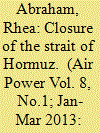

|
|
|
| 2 |
ID:
114904
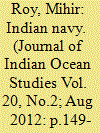

|
|
|
| 3 |
ID:
127382
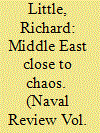

|
|
|
| 4 |
ID:
029789
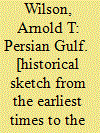

|
|
|
|
|
| Publication |
London, George Allen and Unwin Ltd., 1959.
|
| Description |
xi, 327p.Hbk
|
|
|
|
|
|
|
|
|
|
|
|
Copies: C:1/I:0,R:0,Q:0
Circulation
| Accession# | Call# | Current Location | Status | Policy | Location |
| 000233 | 909.096535/PER 000233 | Main | On Shelf | General | |
|
|
|
|
| 5 |
ID:
151804
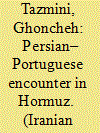

|
|
|
|
|
| Summary/Abstract |
In 2015, the quincentennial commemoration of the Portuguese arrival on the island of Hormuz in the Persian Gulf (1515–1622) revealed the underlying presupposition among Iranians that the Portuguese presence on the island was the harbinger of a long-term pattern of western imperialism. This analysis questions the accuracy of this narrative by advancing a new interpretative framework that does not reduce the holding of Hormuz to simply another dark episode of European colonial history. Circumscribed and limited in aim and reach, Lusitanian activities on Hormuz cannot be brought under the generic rubric of “orientalism,” which is embedded in European colonial tradition, and which, by extension, buttresses Iranian nationalist sentiment about the Persian–Portuguese entanglement. This research demonstrates that Portuguese objectives diverged from the eighteenth and nineteenth century rationalist scientific traditions of the British, French and Germans professing a civilizing mission as a rationale for colonial policies. Whereas the Portuguese operated from a worldview that combined profit, dynastic pride and religious rhetoric, the Portuguese mission to Hormuz was not guided by a grand discourse of civilizing the “other.” While there was a complex interplay of commercial interests and brutal methods on this strategic entrepôt, Portuguese ambitions in Hormuz were confined and elusive, and at best a matter of tribute-taking. The present paper charters some of these complex interactions.
|
|
|
|
|
|
|
|
|
|
|
|
|
|
|
|
| 6 |
ID:
123473
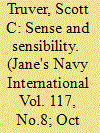

|
|
|
| 7 |
ID:
168975
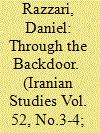

|
|
|
|
|
| Summary/Abstract |
In 1616, the English East India Company expanded its trade into Safavid Iran. The chief merchants in India hoped to acquire a significant share of the Iranian silk trade. After several difficult years in India, the English traders in Surat felt pressure to establish a solid foundation in Iran where they could redirect Iranian silk through Iran’s southern ports and onto Company ships for Europe. Despite Robert Sherley’s promise of wealth and a prosperous market for English cloth, many in the English camp, predominantly Sir Thomas Roe, objected to the silk trade on grounds that it was generally a risky venture. But several leading merchants dismissed Roe’s concerns and pursued the trade without his approval. After early indications that the venture had potential for success, the English silk trade quickly began to falter and finally ceased to exist by 1640. Although its demise was once described as the Company’s failure to produce a substantial quantity of purchasing power—eastern goods, precious metals, and English commodities—this paper explores an alternative explanation that suggests the Company’s failure in Iran was not exclusively the consequence of poor economics.
|
|
|
|
|
|
|
|
|
|
|
|
|
|
|
|